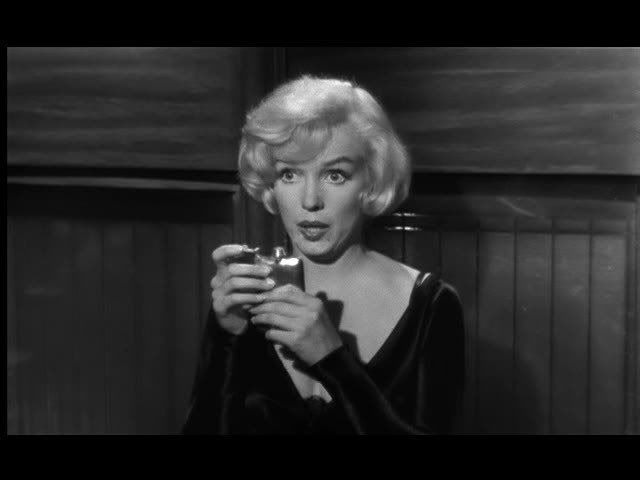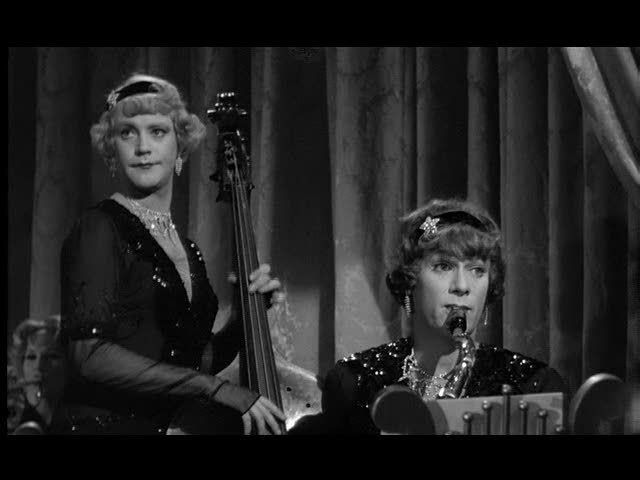
Some comedies toy with gender, twist it, tweak it in interesting ways to generate laughs; Billy Wilder's Some Like It Hot makes a real run at obliterating the very concept, tying the whole idea of gender into such knots that it's virtually impossible to set things straight again by the end of the picture. The paper-thin premise involves a couple of musicians, Joe (Tony Curtis) and Jerry (Jack Lemmon), trying to eke out a living by playing gin joints in Prohibition-era Chicago. The film is framed with a gangster story that sets things in motion when Joe and Jerry accidentally become witnesses to a gangland murder committed by the dapper mob boss Spats Colombo, played by gangster icon George Raft (who even riffs on his iconic role in Howard Hawks' Scarface, asking a hood where he got that "cheap" coin-flipping trick; he got it from Raft, of course, who made it his signature touch in the Hawks classic). The film's opening sets an evocative gangland mood, complete with a witty eye for details: the crooks set up their speakeasy in a funeral parlor, smuggling the booze in by coffin and using "Grandma's funeral" as a code word for the party going on in the back room behind sound-proof walls. But the gangster trappings are really just decorative touches, as it turns out; an excuse to put the struggling musicians into a dazzlingly improbable situation. After barely escaping from Spats' goons, Joe and Jerry are forced to become Josephine and Daphne, posing as women in order to get jobs in an all-female band that's heading down to Florida, far from Spats' gang of murderous "lawyers."
Of course, the transformation of Curtis and Lemmon into a pair of very unlikely-looking women, funny as it is, wouldn't be nearly as brilliant without a true avatar of femininity to contrast against them. Enter Sugar Kane (Marilyn Monroe), who moves "like Jell-O on springs," like she has "a built-in motor or something," in Lemmon's classic words. Sugar is yet another of Monroe's sexed-up, wide-eyed, hip-swiveling confections, with a great deal of her appeal, as usual, arising from her seemingly complete ignorance of the effect she's causing. There's always such an endearingly innocent quality to Monroe's performances, as though she's mystified why everyone's acting so oddly: after all, all she's doing is lounging around in her underwear, whispering huskily and constantly bending over, baring as much cleavage as the censors would tolerate. What's all the fuss about? Nobody but Monroe could be so suggestive while maintaining her playful aloofness from her own seductive persona.
And in this film, her usual playfulness is complicated by the status of her male costars, who must suppress their reactions in order to maintain their disguises. This makes Sugar's moments of sisterly affection with her bandmates truly hilarious: like the scene where she snuggles up into Daphne's bunk and tries to warm up Lemmon's cold feet. It's great stuff, especially since there are few actors who are as expressive and malleable with their faces as Lemmon; seeing Lemmon's rolling eyes and jester's grin set amidst Daphne's makeup and blonde curls only enhances the effect. However, despite Lemmon's best efforts, the jokes about the boys trying to maintain their composure while surrounded by giggling, half-undressed girls soon enough become tired, so it's fortunate that the script has more twists up its skirts.

The film's gender-bending premise really starts to crackle when the band arrives in Florida, where Daphne attracts the attention of the fickle millionaire Osgood Fielding (Joe E. Brown), who's been married "seven or eight times" — he's lost track, but his "mama" is keeping score for him. He's got a thing for showgirls, and he immediately falls for the bass-playing Daphne, asking her about her instrument, whether she uses a bow or (suggestive pause) plucks it; she outdoes his entendre by randily exclaiming that she likes to slap it. The script is constantly inching right up to the line of acceptability like this, with lots of jaw-droppingly audacious lines; there's more sex in this dialogue than there is in most pornos. Osgood's dogged courtship of the initially wary Daphne is one of the film's funniest subplots, culminating in the hilarious scene where the two perform an enthusiastic tango together, trading a rose back and forth between their mouths as they take turns leading. Daphne, initially reluctant, is soon ecstatic, really getting into the dance, nearly forgetting that he's actually a guy named Jerry: when Joe finds him the next morning, Daphne is still cha-cha-ing, on her back in bed, shaking a pair of maracas and humming the music from the night before. Jerry gets so into the gender-bending game that he accepts Osgood's proposal of marriage, prompting some great, lightning-quick exchanges with the horrified Joe, with Jerry remaining blissfully in character as the swept-off-her-feet Daphne. "What are you going to do about the honeymoon?" Joe asks in disbelief, about as direct a reference to his friend's sexual equipment as he could make. "Oh we've been discussing that," Daphne gushes, "He wants to go to the Riviera but I kind of lean towards Niagara Falls." Jerry keeps losing touch with his masculinity, becoming too comfortable in high heels and dresses, so much so that when the duo is later forced to change disguises again, with Jerry donning a bellboy's outfit, he tellingly forgets to doff his heels. Lemmon is having such obvious fun in the role, really camping it up, that Jerry's gender crisis becomes even funnier and more believable.
Joe is a different story, since the film sets Curtis up as the romantic lead opposite Monroe; naturally, he'll have to switch out of drag often enough to generate some credible romance between his character and Sugar, without her getting wise to the transformations. The problem is solved when Joe cooks up a third identity for himself, an eccentric millionaire, heir to the Shell Oil fortune, who cleverly woos the cagey Sugar by playing hard to get. In fact, even if Joe is back in man's clothes, he still isn't quite comfortable in his gender. Instead, in order to get Sugar to hit on him rather than the other way around — he wants to keep the "sensitive" image he's cultivating — he plays the millionaire "Junior" as a cold fish, a guy who was once hurt by lost love and as a result feels nothing when he's around girls now. Despite the story, what he's really playing is a gay guy, complete with an exaggerated accent that's meant to be cultured but comes across as fey. He's posing as a guy who can't be aroused, who feels nothing even when Marilyn's at her sexiest, even after she plants a succession of steamy kisses on his lips. The scene between them on a yacht he's "borrowed" for the night is one of the film's best and funniest, beginning with their rapid-fire pattering dialogue ("Water polo? Isn't that terribly dangerous?" "I'll say, I had two ponies drowned under me.") and culminating in the very sexy sequence where Sugar essentially converts Joe back from a cross-dresser to a completely straight male, her sensuous kisses finally doing the trick.
These sexual shenanigans can hardly even be called the film's subtext; they're its whole raison d'etre. The gangsters return at the finale for some madcap chase sequences straight out of the silent era, complete with multiple disguise changes and manic zigzagging throughout the hotel. Wilder is as comfortable with wild physical comedy like this as he is with the zinger-laden dialogue; arguably even more so, since the film never quite achieves the screwball-fast dialogue of, say, Howard Hawks' dialogue-driven comedies. Wilder's blessed with a clever script packed with great lines, but he sometimes tends to emphasize physical gags instead, not always successfully. Indeed, the film hits a few rare dull patches when Wilder tries to milk too much physical comedy out of a given setup, as he does in the scene where a party in Daphne's train berth becomes overcrowded with leggy girls in nightshirts. The scene is funny at first, but soon wears out its welcome. Wilder's comedic instincts are sometimes to beat a scene like this into the ground; he doesn't always know when to say enough.
But the film's heart remains with the gender confusion of the two leads and, even more so, with Monroe. Certainly, Wilder's camera loves her, lingering over her voluptuous curves and rendering her with more care and attention than is lavished on any other image in the film. In the scene where she sings "I Wanna Be Loved By You," Wilder cleverly casts a shadow across her body, clinging to her curves, obscuring more of her flesh than the barely-there dress she's spilling out of. As she bobs up and down, pursing her lips and whisper-singing the now-famous song, the shadow seems to hover just on the edge of revealing everything, forming a secondary cover-up that just barely maintains her modesty. This coy playfulness with the film's apparent sexual content makes for a consistently clever, uproarious comedy of subversive gender politics.

9 comments:
I love this film. Excellent review, great perspective!
Arguably my favorite film.
Wilder and his various co-writers, in this case I.A.L. Diamond have written some of the greatest film scripts, specifically Some Like it Hot, Double Indemnity and The Apartment. What is truly amazing about Wilder is how, as a foreigner, he picked up not just on American English but on the American idiom.
While Lemmon and Monroe are so great in this film and seem to always get the majority of the credit, Tony Curtis should not be overlooked. It was Curtis who came up with the Cary Grant accent after Wilder asked if he could do any imitations.
Love this film. The great thing about it is that the actors themselves are having so much fun, and the audience is simply asked to join in. Great review :)
Thanks for the comments, all. There are other Wilders I like better -- The Apartment, Sunset Blvd. and One, Two, Three -- but this one is quite funny, with lots of memorable lines and performances. I love films where, as De Opnameleider points out, it's just so obvious that the actors themselves are having a blast making the film
Excellent review. Thanks.
Excellent review of one of my favorite films. When Curtis plays the millionaire, I always thought of that as a satire on Cary Grant's endlessly reluctant-around-women screen persona. I've taught this film several times, and it always goes over well with students.
Great review. I love this movie, but I never noticed the shadow effect you pointed out while Sugar's singing. I'll look for it next time.
Y'know... I really dislike this film. I loved it when I first saw it years ago, particularly when looking at the changes in tone of Monroe's songs throughout the film. However, I find its gender politics painfully dated. There's this endless debate in my mind between this and Tootsie, and while Some Like It Hot perfectly avoids that killer line in Tootsie where Dustin Hoffman says something about being a better man as a woman, I tend to think on a purely comedic level, Tootsie is a lot funnier. I know I'm alone in feeling this way, as it still stands as one of the better straight-guy(s)-dons-drag films, but I seem to dislike it more with every viewing.
I love this movie and enjoyed your review a lot. I don't think the gay angle to Tony Curtis' millionaire persona had occurred to me - I had just thought he was doing a spoof on Cary Grant - but I find it a persuasive idea. Judy
Post a Comment